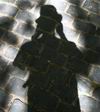It's been a bad week for sheep in Morocco. I'll tell you why in a moment.
A couple of years ago while gazing over maps, dreaming of places to visit, I noticed that I could reach Timbuktu from Europe by travelling overland (and over sea), passing through Spain and Morocco. I made a note to myself to actually do the journey someday. Well, now I am on the way.
I started from Spain, where I took a ferry past Gibraltar, over the 20-odd kilometres to Africa. From the ferry I could see Europe in one direction and Africa in the other, and I was quite disappointed that both continents looked identical. I don't know what I was expecting...churches and castles on one side, elephants and giraffes on the other?
Upon arriving in Morocco I hightailed it down to Fes, one of Morocco's major tourist drawcards. The centre of Fes (and every Moroccan city) is the Medina, the old city, an enormous maze of narrow streets too small for cars, contained within giant walls, where thousands of people - and the occasional animal - crowd and press together, pushing you whatever way. This area, only a couple of kilometres across contains 400,000 people and it seems like every one of them has something to sell. Many women wear hair- or head-coverings, and many men wear brown gowns with pointy hoods. Streets are lined with stalls selling aromatic spices, fresh fruit, dried fruits and nuts, ceramics, carpets, carpets, carpets, sheep, and all sorts of clothing and trinkets you can think of. There are no straight streets, and from the moment I entered through one of the dozen main entrances, I was lost, at the mercy of street urchins to guide me to the nearest gate. There is no way to tell whether going down a crooked lane will lead to a dead end or a major road. I felt like a rat in a giant science experiment, and failing miserably at finding the cheese and the path out.
I loitered on a street so narrow I could touch both walls with my outstretched arms, working out whether I had already seen this street, and whether the ceramic shop I was standing outside was different from any of the others I had already seen, when a man tugged at my sleeved, and said in French "Attention, attention". I thought he was yet another person trying to sell me stuff I didn't want, so I ignored him. Suddenly he grabbed me harder and threw me into the shop, just in time to avoid the sorry-looking donkey, loaded with gas bottles, and coming down the street at a mean pace. After that experience I paid more attention to people's warnings.
The travel literature likes to say how the medina in Fes is a medieval city, unchanged in centuries. I'm no expert on medieval cities but I am pretty sure they didn't have electricity, internet cafes, bootleg CDs for sale, men sitting inside their shops watching European football on TV, and Wham's greatest hits blasting out of apartments.
Plenty of sheep were being sold all around the Medina, wherever the paths were wide enough, because a big Islamic festival was about to happen. For this festival people travel from all over the country to be with their families, and then together the family slaughters a sheep to celebrate...something...I don't know really. The day before the festival there was sheep bleating all day. The next day, a sinister silence... As I have long believed, the family that slaughters together, stays together.
During the day of the sheep massacre I travelled to Rabat, the capital of Morocco. When I walked through Rabat's Medina in the afternoon, the gristly remains of the sheep could be seen. Teenage boys were grilling sheeps' heads on improptu fires, in preparation of stewing the heads to make a Moroccan traditional dish. Piles of bloody sheep fleeces were stacked along the street. I had to be careful not to slip on blood.
On my stomach's behalf, I soon left the Medina and went down to the ocean. Unfortunately I chose the place where the city's sewerage enters the ocean. Around the sewerage pipe a large area of water was a strange pink, which I guess was from the gallons of sheep's blood. Nearby a brave - or foolish - man was surfing, ignoring the unsanitary conditions.
Amazingly the medinas don't smell, and the next day everything was scrubbed clean, all garbage removed, and any trace of sheep and blood had disappeared. Except that the restaurants had lots of sheep dishes on the menu.
Monday, January 16, 2006
Subscribe to:
Post Comments (Atom)

No comments:
Post a Comment